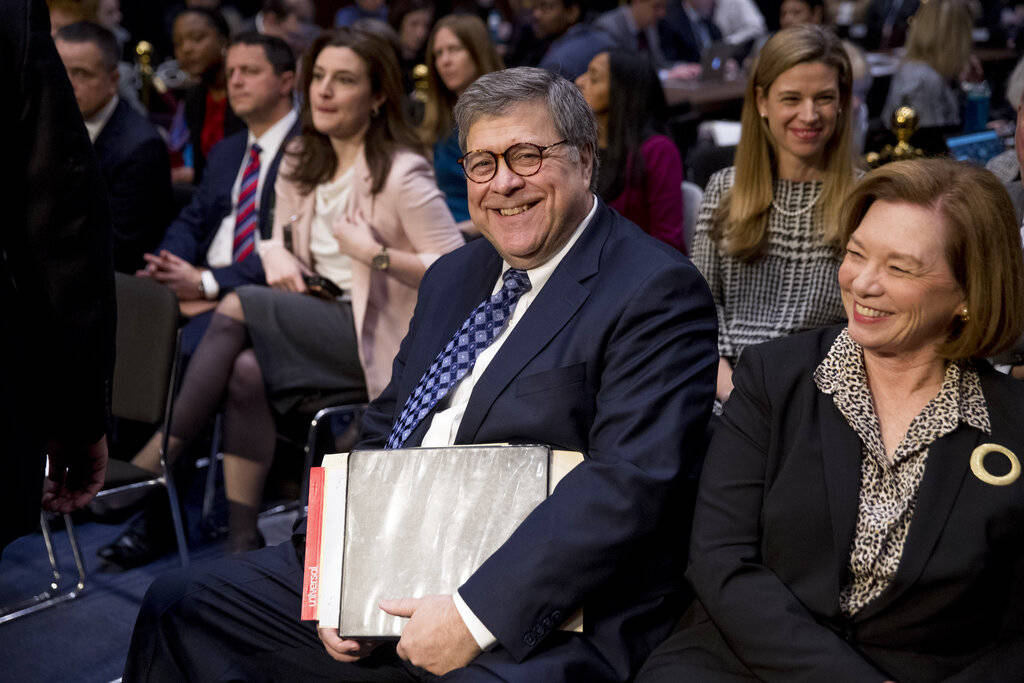Attorney general nominee pledges not to interfere in Russia probe

WASHINGTON — U.S. Attorney General nominee William Barr told a Senate committee Tuesday that he would not interfere with a special counsel investigation into Russian meddling and ties to the Trump presidential campaign in the last presidential election.
Barr told the Senate he would reject any attempt by President Donald Trump or lawmakers to pressure him to act unethically, or interfere with Special Counsel Robert Mueller’s probe.
“I am not going to do anything I think is wrong,” Barr said during his confirmation hearing. “I’m not going to be bullied into doing anything that is wrong.”
Barr testified before the Senate Judiciary Committee, where he was peppered with questions by lawmakers who voiced concern that Trump, who has called Mueller’s probe a “witch hunt,” will try to stop the Russia probe.
Barr’s testimony is significant because he has been critical of Mueller’s probe in the past, and if confirmed, would have oversight of the investigation.
The nominee wrote a memo last year that was critical of the special counsel investigation. But in his testimony, Barr said he would not interfere with the Mueller investigation and would work to uphold its integrity.
“I believe it is vitally important that the special counsel be allowed to complete his investigation,” Barr said.
The hearing took place in a partisan atmosphere in Washington and before a divided government that has resulted in a 25-day partial government shutdown.
“The times in which we live are very difficult times,” Sen. Lindsey Graham, R-S.C., chairman of the Senate Judiciary Committee, said as he opened the hearing in the cavernous Hart Senate Office Building.
Barr, a former attorney general in 1991, appeared to sail through the hearing with the same panel that held the raucous confirmation hearings for Supreme Court Justice Brett Kavanaugh.
Barr backs Sessions
If confirmed, Barr would succeed Jeff Sessions, fired by Trump after withering criticism of his decision to recuse himself over matters related to the Russia probe because of interaction with a Russian official during the presidential election.
Asked if Sessions should have recused himself, Barr said, “I think he did the right thing.”
Sen. Dianne Feinstein, D-Calif., the ranking Democrat on the panel, told Barr that the next attorney general must have “the integrity, the strength and the fortitude to tell the president ‘no,’ regardless of the consequences.”
Trump has demanded loyalty from people he appoints to Cabinet-level positions.
The nominee was queried by Democrats on the panel about his interactions with Trump about the Mueller probe before his nomination, and whether he would withstand pressure by the president to interfere or cut short the investigation.
Barr said he declined to join Trump’s legal defense team. He said he has known Mueller for over 30 years, and told the president the prosecutor is a straight shooter and should be treated as such.
Barr said everyone would be served if the investigation is completed and Congress and the public are informed about what occurred during the 2016 presidential election.
He also assured the Judiciary Committee that he would withstand pressures by the president or lawmakers in regard to the ongoing investigation.
“My allegiances will be to the rule of law,” Barr said.
Confirmation expected
With Republicans in the majority on the committee and the Senate, it is widely expected that Barr will be confirmed to the highest law enforcement officer in the nation.
Republicans on the panel praised Barr for his independence, and said he was well qualified for the position likely to be in the center of the storm when Mueller delivers his report on the investigation.
Despite early assurances from Barr, Democrats grilled him on allegiances and pressure they said he was likely to receive from the White House.
And they noted that Barr wrote an unsolicited memo last June to the Justice Department that questioned why Mueller had asked the president to submit to interrogation about allegations of obstruction of the probe.
Barr said he was not questioning Mueller’s investigation but instead arguing a theory he thought the special counsel was considering involving the president’s firing of FBI Director James Comey.
Feinstein said that in the memo Barr concluded that Mueller was “grossly irresponsible” for pursuing an obstruction of justice case against the president.
Barr said the memo did not address or question the core of the special counsel investigation, but only whether the president should submit to interrogation on the allegation of obstruction to the investigation.
“I don’t believe Mr. Mueller would be involved in a witch hunt,” Barr said.
Barr also questioned Comey’s departure from FBI policy by announcing the closure of the investigation into Hillary Clinton’s use of private email servers when she was secretary of state, and then publicly reopening the probe and again closing it right before the election.
Republicans on the panel asked if the FBI investigation into Trump, disclosed last week by the New York Times, was retaliation for the president’s firing of Comey.
Barr said he was not informed on the investigation, or whether the news story was accurate.
Graham asked Barr to “look into it.”
If Barr is confirmed, he would return to the post he held under President George H.W. Bush.
In 1991, Barr was confirmed unanimously to serve as attorney general. He has been confirmed to Justice Department posts three times in his career.
Contact Gary Martin at gmartin@reviewjournal.com or 202-662-7390. Follow @garymartindc on Twitter.